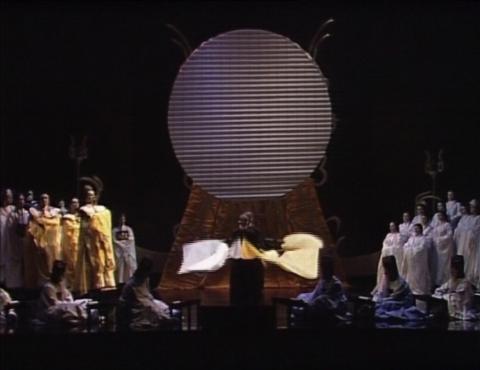|
<< -- 2 -- Robert Anderson TERRIFYING INTENSITY

It is salutary to remember that this Chinese tale set in legendary times was worked up by Carlo
Gozzi as passionate propaganda for the obsolescent commedia dell'arte. Hence Ping, Pang and
Pong, whose woes can sometimes bore us stiff. Improbably the play was chosen by Goethe and Schiller
in 1790 as part of their scheme to launch a German National Theatre in Weimar, and Schiller duly
adapted it to his classic taste. Puccini went to the opposite extreme. Turandot now has an ancestress
raped and murdered by a barbarian king. Hence her psychopathic loathing of men and her insatiable
demand for their heads.

A scene from Act II of Puccini's 'Turandot'. DVD screenshot © 2006 Opus Arte
|
Puccini presents us at once with her grisly decree. She will pronounce to any potential suitor
three riddles: failure to solve them involves summary decapitation
[watch and listen -- 'Popolo di Pekino!' (Act 1), chapter 2, 0:36-1:36].
Calaf (Kenneth Collins), prince of Tartary, is so dazzled by the princess's beauty, which
operagoers have sometimes to take for granted in exchange for her voice, that sight of the young
Prince of Persia going to his fate under the murderous control of lifeguards from some Bondi beach
cannot shake his resolve to attempt Turandot's test
[watch and listen -- 'O giovinetto!' (Act 1), chapter 6, 13:37-14:52].
A Chinese moon, considerably larger than the one we're used to, has also risen to survey the
unedifying spectacle.
Continue >>
Copyright © 3 May 2006
Robert Anderson, London UK

|

